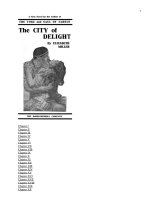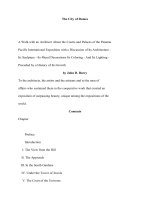The city of masks
Bạn đang xem bản rút gọn của tài liệu. Xem và tải ngay bản đầy đủ của tài liệu tại đây (941.8 KB, 257 trang )
TheProjectGutenbergEBookofTheCityofMasks,byGeorgeBarrMcCutcheon
ThiseBookisfortheuseofanyoneanywhereatnocostandwith
almostnorestrictionswhatsoever.Youmaycopyit,giveitawayor
re-useitunderthetermsoftheProjectGutenbergLicenseincluded
withthiseBookoronlineatwww.gutenberg.org
Title:TheCityofMasks
Author:GeorgeBarrMcCutcheon
Illustrator:MayWilsonPreston
ReleaseDate:July6,2012[EBook#40146]
Language:English
***STARTOFTHISPROJECTGUTENBERGEBOOKTHECITYOFMASKS***
ProducedbyBruceAlbrecht,ErnestSchaal,andtheOnline
DistributedProofreadingTeamat
TheHeadandShouldersofaManRoseQuicklyAbovetheLedge(Page265)
THECITYOFMASKSByGEORGEBARRMcCUTCHEONAUTHOROF
"Mr.Bingle,""JaneCable,""BlackisWhite,"Etc.WithFrontispieceByMAY
WILSONPRESTONA.L.BURTCOMPANYPublishersNewYorkPublished
byarrangementwithDodd,Mead&Company
Copyright,1918
BYDODD,MEADANDCOMPANY,INC
PRINTEDINU.S.A.
CONTENTS
CHAPTERPAGE
ILADYJANETHORNECOMESTODINNER1
IIOUTOFTHEFOURCORNERSOFTHEEARTH12
IIITHECITYOFMASKS24
IVTHESCIONOFANEWYORKHOUSE37
VMR.THOMASTROTTERHEARSSOMETHINGTOHISADVANTAGE 50
VITHEUNFAILINGMEMORY67
VIITHEFOUNDATIONOFTHEPLOT79
VIIILADYJANEGOESABOUTITPROMPTLY94
IXMR.TROTTERFALLSINTOANEWPOSITION110
XPUTTINGTHEIRHEADS—ANDHEARTS—TOGETHER121
XIWINNINGBYANOSE134
XIIINTHEFOG155
XIIINOTCLOUDSALONEHAVELININGS172
XIVDIPLOMACY188
XVONENIGHTATSPANGLER'S202
XVISCOTLANDYARDTAKESAHAND219
XVIIFRIDAYFORLUCK233
XVIIIFRIDAYFORBADLUCK250
XIXFROMDARKNESSTOLIGHT263
XXANEXCHANGEOFCOURTESIES279
XXITHEBRIDE-ELECT294
XXIITHEBEGINNING307
THECITYOFMASKS
CHAPTERI
LADYJANETHORNECOMESTODINNER
THEMarchionesscarefullydrapedthedust-clothovertheheadofanandiron
and,beforeputtingthequestiontotheparlour-maid,consulted,withtheintensity
of a near-sighted person, the ornate French clock in the centre of the
mantelpiece.Thenshebrushedherfingersonthevoluminousapronthatalmost
completelyenvelopedherslightperson.
"Well,whoisit,Julia?"
"It'sLordTemple,ma'am,andhewantstoknowifyou'retoobusytocometo
the'phone.Ifyouare,I'mtoaskyousomething."
The Marchioness hesitated. "How do you know it is Lord Eric? Did he
mentionhisname?"
"He did, ma'am. He said 'this is Tom Trotter speaking, Julia, and is your
mistress disengaged?' And so I knew it couldn't be any one else but his
Lordship."
"Andwhatareyoutoaskme?"
"He wants to know if he may bring a friend around tonight, ma'am. A
gentlemanfromConstantinople,ma'am."
"A Turk? He knows I do not like Turks," said the Marchioness, more to
herselfthantoJulia.
"Hedidn'tsay,ma'am.JustConstantinople."
TheMarchionessremovedherapronandhandedittoJulia.Youwouldhave
thought she expected to confront Lord Temple in person, or at least that she
wouldbefullyvisibletohimdespitethedistanceandtheinterveningbuildings
that lay between. Tucking a few stray locks of her snow-white hair into place,
she approached the telephone in the hall. She had never quite gotten over the
impressionthatonecouldbeseenthroughaswellasheardoverthetelephone.
She always smiled or frowned or gesticulated, as occasion demanded; she was
never languid, never bored, never listless. A chat was a chat, at long range or
short;itdidn'tmatter.
"Areyouthere?Goodevening,Mr.Trotter.Socharmedtohearyourvoice."
ShehadseatedherselfatthelittleoldItaliantable.
Mr.Trotterdevotedafulltwominutestoexplanations.
"Do bring him with you," cried she. "Your word is sufficient. He must be
delightful.Ofcourse,IshudderedalittlewhenyoumentionedConstantinople.I
always do. One can't help thinking of the Armenians. Eh? Oh, yes,—and the
harems."
Mr.Trotter:"Bytheway,areyouexpectingLadyJanetonight?"
TheMarchioness:"Sherarelyfailsus,Mr.Trotter."
Mr.Trotter:"Right-o!Well,good-bye,—andthankyou.I'msureyouwilllike
thebaron.Heisatrifleseedy,asIsaidbefore,—sailingvessel,youknow,andall
thatsortofthing.BywayofCapeTown,—prettywellupagainstitforthepast
yearortwobesides,—butaregularfellow,astheysayoverhere."
TheMarchioness:"Wheredidyousayheisstopping?"
Mr.Trotter:"Can'tforthelifeofmerememberwhetherit'sthe'Sailors'Loft'
or the 'Sailors' Bunk.' He told me too. On the water-front somewhere. I knew
himinHongKong.Hesayshehascutitallout,however."
TheMarchioness:"Cutitallout,Mr.Trotter?"
Mr.Trotter,laughing:"Drink,andallthatsortofthing,youknow.Jollygood
thingtoo.Igiveyoumypersonalguaranteethathe—"
TheMarchioness:"Saynomoreaboutit,Mr.Trotter.Iamsureweshallall
behappytoreceiveanyfriendofyours.Bytheway,whereareyounow—where
areyoutelephoningfrom?"
Mr.Trotter:"Drugstorejustaroundthecorner."
TheMarchioness:"Abooth,Isuppose?"
Mr.Trotter:"Oh,yes.Tightasasardinebox."
TheMarchioness:"Good-bye."
Mr. Trotter: "Oh—hello? I beg your pardon—are you there? Ah, I—er—
neglectedtomentionthatthebaronmaynotappearathisbesttonight.Yousee,
thepoorchapisashadelargeformyclothes.Naturally,beingasailor-man,he
hasn't—er—a very extensive wardrobe. I am fixing him out in a—er—rather
abandoned evening suit of my own. That is to say, I abandoned it a couple of
seasonsago.Rathernobbythingforawaiter,butnot—er—whatyoumightcall
—"
The Marchioness, chuckling: "Quite good enough for a sailor, eh? Please
assure him that no matter what he wears, or how he looks, he will not be
conspicuous."
After this somewhat ambiguous remark, the Marchioness hung up the
receiver and returned to the drawing-room; a prolonged search revealing the
dust-clothonthe"nub"oftheandiron,justwhereshehadleftit,shefelltowork
oncemoreonthevelvetysurfaceofarareoldSpanishcabinetthatstoodinthe
corneroftheroom.
"Don'tyouwantyourapron,ma'am?"inquiredJulia,sittingbackonherheels
and surveying with considerable pride the leg of an enormous throne seat she
hadbeenrubbingwithallthestrengthofherstoutarms.
Hermistressignoredthequestion.Shedabbedintoatinyrecessandwriggled
herfingervigorously.
"Ican'timaginewhereallthedustcomesfrom,Julia,"shesaid.
"Some of it comes from Italy, and some of it from Spain, and some from
France," said Julia promptly. "You could rub for a hundred years, ma'am, and
there'dstillbedustthatyoucouldn'tfind,nottosaveyoursoul.Andwhynot?
I'd bet my last penny there's dust on that cabinet this very minute that settled
beforeNapoleonwasborn,wheneverthatwas."
"Idaresay,"saidtheMarchionessabsently.
MoreoftenthanotherwiseshefailedtohearallthatJuliasaidtoher,orinher
presencerather,forJulia,wiseinassociation,hadcometoconsidertheselapses
ofinattentionasopeningsforprolongedandrarelycoherentsoliloquiesontopics
ofthemoment.Julia,byvirtueoflongserviceandamostsatisfyingavoidance
of matrimony, was a privileged servant between the hours of eight in the
morning and eight in the evening. After eight, or more strictly speaking, the
moment dinner was announced, Julia became a perfect servant. She would no
more have thought of addressing the Marchioness as "ma'am" than she would
havecalledtheKingofEngland"mister."ShehadcrossedtheAtlanticwithher
mistress eighteen years before; in mid-ocean she celebrated her thirty-fifth
birthday,and,asshehadbeeninthefamilyfortenyearspriortothatevent,even
a child may solve the problem that here presents a momentary and totally
unnecessary break in the continuity of this narrative. Julia was English. She
spoke no other language. Beginning with the soup, or the hors d'œuvres on
occasion,FrenchwasspokeninthehouseoftheMarchioness.Physicallyunable
to speak French and psychologically unwilling to betray her ignorance, Julia
becameamodelservant.Shelapsedintoperfectsilence.
TheMarchionessseldomifeverdinedalone.Shealwaysdinedinstate.Her
guests,—English, Italian, Russian, Belgian, French, Spanish, Hungarian,
Austrian,German,—conversedsolelyinFrench.Itwasaveryagreeablewayof
symphonizingBabel.
The room in which she and the temporarily imperfect though treasured
servantwereemployedintheduskofthisstormydayinMarchwasatthetopof
anold-fashionedbuildinginthebusiestsectionofthecity,abuildingthathad,so
far, escaped the fate of its immediate neighbours and remained, a squat and
insignificantpygmy,elbowingwithsomearrogancetheloftystructuresthathad
shotuponeithersideofitwithincredibleswiftness.
Itwasalargeroom,atleastthirtybyfiftyfeetindimensions,withavaulted
ceiling that encroached upon the space ordinarily devoted to what architects,
buildersandtheBoardofHealthdescribeasanairchamber,nextbelowtheroof.
Therewasnoelevatorinthebuilding.Onehadtoclimbfourflightsofstairsto
reachtheapartment.
Fromitslong,heavilycurtainedwindowsonelookeddownuponacrowded
cross-town thoroughfare, or up to the summit of a stupendous hotel on the
oppositesideofthestreet.Therewasasmallfoyerattherearofthisloftyroom,
withanentrancefromthenarrowhalloutside.Suspendedinthewidedoorway
between the two rooms was a pair of blue velvet Italian portières of great
antiquity and, to a connoisseur, unrivaled quality. Beyond the foyer and
extendingtotheareawallwastherathercommodiousdining-room,withitslong
oaken English table, its high-back chairs, its massive sideboard and the
chandelier that is said to have hung in the Doges' Palace when the Bridge of
Sighswasanewandthrivingavenueofcommunication.
Atleast,sostatedthedealer'stagtuckedcarelesslyamongthecrystalprisms,
supplying the observer with the information that, in case one was in need of a
chandelier, its price was five hundred guineas. The same curious-minded
observerwouldhavediscovered,ifhewerenotabovegettingdownonhishands
andkneesandpeeringunderthetable,apricetag;andbyexertingthestrength
necessarytopullthesideboardawayfromthewall,asimilarobjectwouldhave
beenexposed.
In other words, if one really wanted to purchase any article of furniture or
decoration in the singularly impressive apartment of the Marchioness, all one
hadtodowastosignifythedesire,produceacheckoritsequivalent,andgivean
addresstothecompetent-lookingyoungwomanwhowouldputinanappearance
withsingularpromptnessinresponsetoacoupleofpunchesatanelectricbutton
justoutsidethedoor,anytimebetweennineandfiveo'clock,Sundaysincluded.
The drawing-room contained many priceless articles of furniture, wholly
antique—(andsoguaranteed),besidesrugs,draperies,tapestriesandstuffsofthe
rarestquality.Bronzes,porcelains,pottery,thingsofjadeandalabaster,sconces,
candlesticks and censers, with here and there on the walls lovely little
"primitives"ofuntoldvalue.Themostexotictastehadorderedthedistribution
and arrangement of all these objects. There was no suggestion of crowding,
nothing haphazard or bizarre in the exposition of treasure, nothing to indicate
thatacheapintelligencerevelledinrichpossessions.
You would have sat down upon the first chair that offered repose and you
would have said you had wandered inadvertently into a palace. Then,
emboldened by an interest that scorned politeness, you would have got up to
inspect the riches at close range,—and you would have found price-marks
everywheretoovercometheimpressionthatAladdinhadbeenrubbinghislamp
allthewayupthedingy,tortuousstairs.
Youarenot,however,intheshopofadealerinantiques,price-markstothe
contrary.Youareinthehomeof aMarchioness,andsheisnotadealerinold
furniture,youmaybequitesureofthat.Shedoesnotoweapennyonasingle
articleintheapartmentnordoesshe,ontheotherhand,ownapenny'sworthof
anythingthatmeetstheeye,—unless,ofcourse,oneexceptsthedust-clothand
thecanofpolishthatfollowsJuliaabouttheroom.Norisitaloanexhibit,nor
thesettingforabazaar.
Theapartmentbeingonthetopfloorofafive-storybuilding,itisnecessary
toaccountfortheremainingfour.Intherearofthefourthfloortherewasasmall
kitchen and pantry from which a dumb-waiter ascended and descended with
vehement enthusiasm. The remainder of the floor was divided into four rather
smallchambers,eachopeningintotheouterhall,withtwobath-roomsinserted.
Each of these rooms contained a series of lockers, not unlike those in a clubhouse. Otherwise they were unfurnished except for a few commonplace cane
bottomchairsinvariousstagesofdecrepitude.
The third floor represented a complete apartment of five rooms, daintily
furnished.ThiswaswheretheMarchionessreallylived.
Commerce,afterafashion,occupiedthetwolowerfloors.Itstoppedshortat
thebottomofthesecondflightofstairswhereitencounteredanobstacleinthe
shape of a grill-work gate that bore the laconic word "Private," and while
commercemayhavepeepedinquisitivelythroughandbeyondthebarrieritwas
never permitted to trespass farther than an occasional sly, surreptitious and
unavailingtwistoftheknob.
The entire second floor was devoted to work-rooms in which many sewing
machinesbuzzedduringthedayandwenttorestatsixintheevening.Tables,
chairs, manikins, wall-hooks and hangers thrust forward a bewildering
assortmentoffabricsinallstagesofdevelopment,fromanoriginaluncutpiece
toapracticallycompletedgarment.Inotherwords,herewasthework-shopof
themostexclusive,mostexpensivemodisteinallthegreatcity.
Thegroundfloor,orratherthefloorabovetheEnglishbasement,contained
the salon and fitting rooms of an establishment known to every woman in the
cityas
DEBORAH'S.
ToreturntotheMarchionessandJulia.
"Notthatalittledustorevenagreatdealofdirtwillmakeanydifferentto
thePrincess,"theformerwassaying,"but,justthesame,Ifeelbetter,ifIknow
we'vedoneourbest."
"ThanktheLord,shedon'tcomeveryoften,"wasJulia'sfrankremark."It's
thestairs,Ifancy."
"Andthecar-fare,"addedhermistress."Isitsixo'clock,Julia?"
"Yes,ma'am,itis."
TheMarchionessgroanedalittleasshestraightenedupandtossedthedustcloth on the table. "It catches me right across here," she remarked, putting her
handtothesmallofherbackandwrinklinghereyes.
"Youshouldn'tbedoingmywork,"scoldedJulia."It'snotforthelikesofyou
tobe—"
"I shall lie down for half an hour," said the Marchioness calmly. "Come at
half-pastsix,Julia."
"JustLadyJane,ma'am?Nooneelse?"
"No one else," said the other, and preceded Julia down the two flights of
stairstothecharminglittleapartmentonthethirdfloor."Sheisadeargirl,andI
enjoyhavingheralltomyselfonceinawhile."
"Sheisso,ma'am,"agreedJulia,andadded."Theoftenerthebetter."
At half-past seven Julia ran down the stairs to open the gate at the bottom.
She admitted a slender young woman, who said, "Thank you," and "Good
evening,Julia,"inthesoftest,loveliestvoiceimaginable,andhurriedup,pastthe
apartmentoftheMarchioness,tothefourthfloor.Julia,incapandapron,worea
pleasedsmileasshewentintoputthefinishingtouchesonthecoiffureofher
mistress.
"Pitythereisn'tmorelikeher,"shesaid,attheendoffiveminutes'reflection.
Patting the silvery crown of the Marchioness, she observed in a less detached
manner:"AsIalwayssays,thewonderfulpartisthatit'sallyourown,ma'am."
"I am beginning to dread the stairs as much as any one," said the
Marchioness, as she passed out into the hall and looked up the dimly lighted
steps."Thatisabadsign,Julia."
Amassofcoalscrackledinthebigfireplaceonthetopfloor,andatallman
intheresplendentliveryofafootmanwasengagedinpokingthemupwhenthe
Marchionessentered.
"Bitterlycold,isn'tit,Moody?"inquiredshe,approachingwithstatelytread,
herlorgnonlifted.
"Itis,mylady,—extremelynawsty,"repliedMoody."Thetramsareabitoff,
orIshould'ave'adthecoalsgoing'alfanhoursoonerthan—Ahem!Theycallit
ablizzard,mylady."
"Iknow,thankyou,Moody."
"Thankyou,mylady,"andhemovedstifflyoffinthedirectionofthefoyer.
TheMarchionesslanguidlyselectedamagazinefromthelitterofperiodicals
onthetable.ItwasLaFigaro,andofrecentdate.Thereweremagazinesfrom
everycapitalinEuropeonthatlongandtime-worntable.
Awarm,softlightfilledtheroom,shedbyantiquelanthornsandwall-lamps
thatgaveforthnocruelglare.Standingbesidethetable,theMarchionesswasa
remarkablepicture.Theslight,droopingfigureofthewomanwiththedust-cloth
and creaking knees had been transformed, like Cinderella, into a fairly regal
creature attired in one of the most fetching costumes ever turned out by the
rapaciousDeborah,ofthefirstfloorfront!
The foyer curtains parted, revealing the plump, venerable figure of a butler
whowouldhavedonecredittothelordliesthouseinallEngland.
"LadyJaneThorne,"heannounced,andaslim,radiantyoungpersonentered
theroom,andswiftlyapproachedthesmilingMarchioness.
CHAPTERII
OUTOFTHEFOURCORNERSOFTHEEARTH
"AM I late?" she inquired, a trace of anxiety in her smiling blue eyes. She
was clasping the hand of the taut little Marchioness, who looked up into the
lovelyfacewiththefrankestadmiration.
"Ihaveonlythisinstantfinisheddressing,"saidherhostess."Moodyinforms
mewe'reinforablizzard.Isitsobadasallthat?"
"Whataperfectlyheavenlyfrock!"criedLadyJaneThorne,standingoff to
take in the effect. "Turn around, do. Exquisite! Dear me, I wish I could—but
there!Wishingisaformofenvy.Weshouldn'twishforanything,Marchioness.
Ifwedidn't,don'tyouseehowperfectlydelightedweshouldbewithwhatwe
have?Oh,yes,—itisahorridnight.Thetrolley-carsareblocked,theomnibuses
arestalled,andwalkingisalmostimpossible.Howgoodthefirelooks!"
"Cheerful,isn'tit?Nowyoumustletmehavemyturnatwishing,mydear.If
Icouldhavemywish,youwouldbedisportingyourselfinthebestthatDeborah
canturnout,andyouwouldbeworthmillionstoherasanadvertisement.You've
gotstyle,figure,class,verve—everything.Youcarryyourclothesasifyouwere
madeforthemandnottheotherwayround."
"ThisgownissooldIsometimesthinkIwasmadeforit,"saidthegirlgaily.
"Ican'trememberwhenitwasmadeforme."
Moodyhaddrawntwochairsuptothefire.
"Rubbish!"saidtheMarchioness,sittingdown."Toastyourtoes,mydear."
Lady Jane's gown was far from modish. In these days of swift-changing
fashionsforwomen,ithadbecomepassélongbeforeitsusefulnessoritsbeauty
had passed. Any woman would have told you that it was a "season before last
model," which would be so distantly removed from the present that its owner
maybeforgiventhejustifiableinventionconcerninghermemory.
ButLadyJane'sfigurewasnotold,norpassé,norevenathingtobeforgotten
easily. She was straight, andslim,and sound ofbodyandlimb.Thatistosay,
shestoodwellonherfeetandsuggestedstrengthratherthanfragility.Herneck
andshoulders weresmooth andwhiteand firm; her armsshapelyandcapable,
herhandslongandslenderandaristocratic.Herdarkbrownhairwasabundant
and wavy;—it had never experienced the baleful caress of a curling-iron. Her
firm,redlipswereofthesmilingkind,—andshemusthaveknownthatherteeth
were white and strong and beautiful, for she smiled more often than not with
partedlips.Therewascharacter,intelligenceandbreedinginherface.
Sheworeasimpleblackvelvetgown,close-fitting,—pleaserememberthatit
was of an antiquity not even surpassed, as things go, by the oldest rug in the
apartment,—withashorttrain.ShewasfullyaheadtallerthantheMarchioness,
whichisn'tsayingmuchwhenyouareinformedthatthelatterwasatleasthalf-aheadshorterthanawomanofmediumheight.
On the little finger of her right hand she wore a heavy seal ring of gold. If
you had known her well enough to hold her hand—to the light, I mean,—you
would have been able to decipher the markings of a crest, notwithstanding the
factthatagehadallbutobliteratedthelines.
Dinner was formal only in the manner in which it was served. Behind the
chairoftheMarchioness,Moodyposedloftilywhennototherwiseemployed.A
criticalobserverwouldhavetakennoteofthethreadbareconditionofhiscoat,
especiallyattheelbows,andthesomewhatsnugwayinwhichitadheredtohim,
fore and aft. Indeed, there was an ever-present peril in its snugness. He was
painfullydeliberateanddetached.
Fromtimetotime,asecondfootman,addressedasMcFaddan,pausedback
ofLadyJane.HischinwasnotquitesohighintheairasMoody's;thehigherhe
raiseditthelessitlookedlikeachin.McFaddan,youwouldremark,carrieda
great deal of weight above the hips. The ancient butler, Cricklewick, decanted
thewine,liftedhisrighteyebrowforthebenefitofMoody,theleftindirecting
McFaddan,andcringedslightlywitheachtripupwardofthedumb-waiter.
The Marchioness and Lady Jane were in a gay mood despite the studied
solemnityofthethreeservants.Asdinnerhasnoconnectionwiththisnarrative
except to introduce an effect of opulence, we will hurry through with it and
allowMoodyandMcFaddantodrawbackthechairsonasignaltransmittedby
Cricklewick,andreturntothedrawing-roomwiththetwoladies.
"A quarter of nine," said the Marchioness, peering at the French clock
throughherlorgnon."IamquitesurethePrincesswillnotventureoutonsucha
nightasthis."
"She'sreallyquiteanawfulpill,"saidLadyJanecalmly."Iforonesha'n'tbe
broken-heartedifshedoesn'tventure."
"Forheaven'ssake,don'tletCricklewickhearyousaysuchathing,"saidthe
Marchionessinafurtiveundertone.
"I've heard Cricklewick say even worse," retorted the girl. She lowered her
voicetoa confidentialwhisper."Nolongeragothanyesterdayhe told methat
shemadehimtired,orsomethingofthesort."
"Poor Cricklewick! I fear he is losing ambition," mused the Marchioness.
"Anidealbutlerbutamostdrearycreaturetheinstantheattemptstobeahuman
being.Itisn'tpossible.McFaddanisquitehuman.That'swhyheissofat.Iam
notsurethatIevertoldyou,buthewasquiteaslim,punyladwhenCricklewick
tookhimoutofthestablesandmadeaverydecentfootmanoutofhim.Thatwas
agreatmanyyearsago,ofcourse.Camelfordlefthimathousandpoundsinhis
will. I have always believed it was hush money. McFaddan was a very wideawakechapinthosedays."TheMarchionessloweredoneeye-lidslowly.
"And, by all reports, the Marquis of Camelford was very well worth
watching,"saidLadyJane.
"Hearthewind!"criedtheMarchioness,withalittleshiver."Howitshrieks!"
"WewerespeakingoftheMarquis,"saidLadyJane.
"Butonemayalwaysfallbackontheweather,"saidthe Marchioness drily.
"EvenatitsworstitisapleasanterthingtodiscussthanCamelford.Youcan'tget
anythingoutofme,mydear.Iwashisnextdoorneighbourfortwentyyears,and
Idon'tbelieveintalkingaboutone'sneighbour."
Lady Jane stared for a moment. "But—how quaint you are!—you were
marriedtohimalmostaslongasthat,wereyounot?"
"My clearest,—I may even say my dearest,—recollection of him is as a
neighbour,LadyJane.Hewasmostagreeablenextdoor."
Cricklewickappearedinthedoor.
"CountAntonioFogazario,"heannounced.
A small, wizened man in black satin knee-breeches entered the room and
approachedtheMarchioness.Withcourtlygraceheliftedherfingerstohislips
and,inavoicethatquaveredslightly,declaredinFrenchthathisjoyonseeing
heragainwasonlysurpassedbythehideousgloomhehadexperiencedduring
theweekthathadelapsedsincetheirlastmeeting.
"ButnowthegloomisdispelledandIambaskinginsunshinesorareandsoft
and—"
"MydearCount,"brokeintheMarchioness,"youforgetthatweareenjoying
theworstblizzardoftheyear."
"Enjoying,—vastlyenjoyingit!"hecried."Itisthemostenchantingblizzard
Ihaveeverknown.Ah,mydearLadyJane!Thisisdelightful!"
His sharp little face beamed with pleasure. The vast pleated shirt front
extended itself to amazing proportions, as if blown up by an invisible though
prodigiousbellows,andhiselbowdescribedanangleofconsiderableelevation
as he clasped the slim hand of the tall young woman. The crown of his sleek
blacktoupeewasonalinewithhershoulder.
"God bless me," he added, in a somewhat astonished manner, "this is most
gratifying.Icouldnothaveliftedithalfthathighyesterdaywithoutexperiencing
themostexcruciatingagony."Heworkedhisarmupanddownexperimentally.
"Quiteallright,quiteallright.IfearedIwasinforanothersiege.Icannottell
youhowdelightedIam.Ahem!WherewasI?Oh,yes—Thisisapleasure,Lady
Jane,apositivedelight.Howcharmingyouarelook—"
"Save your compliments, Count, for the Princess," interrupted the girl,
smiling."Sheiscoming,youknow."
"I doubt it," he said, fumbling for his snuff-box. "I saw her this afternoon.
Chilblains. Weather like this, you see. Quite a distance from her place to the
street-cars.Frightfulgoing.Idoubtitverymuch.Now,whatwasitshesaidto
me this afternoon? Something very important, I remember distinctly,—but it
seemstohaveslippedmymindcompletely.Iamfearfullyannoyedwithmyself.
I remember with great distinctness that it was something I was determined to
remember,andhereIamforgetting—Ah,letmesee!Itcomestomelikeaflash.
Ihaveit!Shesaidshefeltasthoughshehadacoldcomingonorsomethinglike
that.Yes,Iamsurethatwasit.Iremembersheblewhernosefrequently,andshe
alwaysmakesadreadfulnoisewhensheblowshernose.Areallyunforgettable
noise,youknow.Now,whenIblowmynose,Idon'tbehavelikeanelephant.I
—"
"Youblowitlikeagentleman,"interruptedtheMarchioness,ashepausedin
someconfusion.
"IndeedIdo,"hesaidgratefully."Inthemostpolishedmannerpossible,my
dearlady."
LadyJaneputherhandkerchieftoherlips.Therewasaperiodofsilence.The
Countappearedtobethinkingwithgreatintensity.Hehadaharassedexpression
aboutthecornersofhisnose.Itwashewhobrokethesilence.Hebrokeitwitha
mosttremendoussneeze.
"Thebeastlysnuff,"hesaidinapology.
Cricklewick'svoiceseemedtoactasanechototheremark.
"The Right-Honourable Mrs. Priestly-Duff," he announced, and an angular,
middle-agedladyinarose-colouredgownenteredtheroom.Shehadaverylong
nose and prominent teeth; her neck was of amazing length and appeared to be
attachedtohershouldersbymeansofvertical,skin-coveredropes,runningfrom
torsotopointsjustbehindherears,wheretheywerelostinamattingoffaded,
straw-coloured hair. On second thought, it may be simpler to remark that her
neck was amazingly scrawny. It will save confusion. Her voice was a trifle
stridentandherFrenchexecrable.
"Isn'titawful?"shesaidasshejoinedthetrioatthefireplace."IthoughtI'd
nevergethere.Twohourscoming,mydear,andImustbestartinghomeatonce
ifIwanttogettherebeforemidnight."
"ThePrincesswillbehere,"saidtheMarchioness.
"I'llwaitfifteenminutes,"saidthenew-comercrisply,pullinguphergloves.
"I've had a trying day, Marchioness. Everything has gone wrong,—even the
drains. They're frozen as tight as a drum and heaven knows when they'll get
themthawedout!WhoeverheardofsuchweatherinMarch?"
"Ah,mydearMrs.Priestly-Duff,youshouldnotforgetthebeautifulsunshine
wehadyesterday,"saidtheCountcheerily.
"Precious little good it does today," she retorted, looking down upon him
fromaloftyheight,andasifshehadnotnoticedhispresencebefore."Whendid
youcomein,Count?"
"It is quite likely the Princess will not venture out in such weather,"
interposedtheMarchioness,sensingsqualls.
"Well,I'llstopabitanywayandgetmyfeetwarm.Ihopeshedoesn'tcome.
Sheisagooddealofawetblanket,youmustadmit."
"Wetblankets,"begantheCountargumentatively,andthen,catchingaglance
fromtheMarchioness,clearedhisthroat,blewhisnose,andmumbledsomething
aboutpoorpeoplewhohadnoblanketsatall,Godhelpthemonsuchanightas
this.
LadyJanehadturnedawayfromthegroupandwasidlyturningtheleavesof
theIllustratedLondonNews.Thesmallestintelligencewouldhavegraspedthe
factthatMrs.Priestly-Duffwasnotagenialsoul.
"Whoelseiscoming?"shedemanded,fixingthelittlehostesswiththestare
thathadjustbeenremovedfromthebackofLadyJane'shead.
Cricklewickansweredfromthedoorway.
"Lord Temple. Baron—ahem!—Whiskers—eh? Baron Wissmer. Prince
WaldemardeBosky.CountWilhelmFrederickVonBlitzen."
Four young men advanced upon the Marchioness, Lord Temple in the van.
He was a tall, good-looking chap, with light brown hair that curled slightly
abovetheears,andeyesthatdanced.
"This, my dear Marchioness, is my friend, Baron Wissmer," he said, after
bendinglowoverherhand.
TheBaron,whosebroadhandswereencasedinimmaculatewhiteglovesthat
failedbyawidemargintobuttonacrosshispowerfulwrists,smiledsheepishly
asheenvelopedherfingersinhishugepalm.
"Itisgoodofyoutoletmecome,Marchioness,"hesaidawkwardly,adeep
flushspreadingoverhissea-tannedface."IfImanagetodeportmyselflikethe
bullinthechinashop,praylayittoclumsinessandnottoignorance.Ithasbeen
averylongtimesinceItouchedthehandofaMarchioness."
"Small people, like myself, may well afford to be kind and forgiving to
giants,"saidshe,smiling."Dearme,howhugeyouare."
"IwasonceintheEmperor'sGuard,"saidhe,straighteninghisfiguretoits
fullsixfeetandahalf."TheBlueHussars.ImayaddwithpridethatIwasnotso
horriblyclumsyinregimentals.Afterall,itistheclothesthatmakestheman."
He smiled as he looked himself over. "I shall not be at all offended or even
embarrassedifyousay'goodness,howyouhavegrown!'"
"The best tailor in London made that suit of clothes," said Lord Temple,
surveyinghisfriendwithanappraisingeye.Outofthecornerofthesameeyehe
explored the region beyond the group that now clustered about the hostess.
Evidently he discovered what he was looking for. Leaving the Baron high and
dry,heskirtedtheedgeofthegroupand,withbeamingface,cametoLadyJane.
"MyfamilyisofVienna,"theBaronwassayingtotheMarchioness,"butof
lateyearsIhavecalledConstantinoplemyhome."
"I understand," said she gently. She asked no other question, but, favouring
him with a kindly smile, turned her attention to the men who lurked
insignificantlyintheshadowofhisvastbulk.
ThePrincewasapale,dreamyyoungmanwithflowingblackhairthatmust
havebeenaconstantmenacetohisvision,judgingbythefrequentandgraceful
sweep of his long, slender hand in brushing the encroaching forelock from his
eyes,overwhichitspreadbrieflyinthenatureofaveil.Hehadthefingersofa
musician, the bearing of a violinist. His head drooped slightly toward his left
shoulder,whichwasalwaysraisedatrifleabovetheleveloftheright.Andthere
wasinhissoftbrowneyesthefarawaylookofthedetached.Theinsigniaofhis
househungsuspendedbyaredribboninthecentreofhiswhiteshirtfront,while
onthelapelofhiscoatreposedtheemblemoftheOrderoftheGoldenStar.He
wasaPole.
Count Von Blitzen, a fair-haired, pink-skinned German, urged himself
forwardwithtypical,not-to-be-deniedarrogance,andcrushedthefingersofthe
Marchioness in his fat hand. His broad face beamed with an all-enveloping
smile.
"Onlypatriotsandloversventureforthonsuchnightsasthis,"hesaid,ina
gutturalvoicethatrenderedhisFrenchalmostlaughable.
"Withanoccasionalthieforvarlet,"supplementedtheMarchioness.
"Ach,Dieu,"murmuredtheCount.
Fresh arrivals were announced by Cricklewick. For the next ten or fifteen
minutes they came thick and fast, men and women of all ages, nationality and
condition, and not one of them without a high-sounding title. They disposed
themselvesaboutthevastroom,andasubduedvocalhubbubensued.Ifhereand
there elderly guests, with gnarled and painfully scrubbed hands, preferred
isolationandthepictorialcontentsofamagazinefromthelandoftheirnativity,
itwasnotwithsnobbishintentions.Theywereabsorbingthenewsfrom"home,"
intheregularweeklydoses.
The regal, resplendent Countess du Bara, of the Opera, held court in one
corneroftheroom.AnotherwasglorifiedbyapetitebaronessfromtheArtists'
Colonyfardown-town,whilearatherdowdyladywithacoronetmonopolized
theattentionofasmallgroupinthecentreoftheroom.
LadyJaneThorneandLordTemplesattogetherinadimrecessbeyondthe
greatchairofstate,andconversedinlowandfarfromimpersonaltones.
Cricklewick appeared in the doorway and in his most impressive manner
announced Her Royal Highness, the Princess Mariana Theresa Sebastano
MicheliniCelestinediPavesi.
And with the entrance of royalty, kind reader, you may consider yourself
introduced, after a fashion, to the real aristocracy of the City of New York,
UnitedStatesofAmerica,—thetitledriff-raffoftheworld'scosmopolis.
CHAPTERIII
THECITYOFMASKS
NEWYORKisnotmerelyameltingpotforthepoorandthehumbleofthe
lands of the earth. In its capacious depths, unknown and unsuspected, float
atomsofanentirelydifferentsort:humanbeingswiththebloodofthehigh-born
and lofty in their veins, derelicts swept up by the varying winds of adversity,
adventure,injustice,lawlessness,fearandindependence.
Lordsandladies,dukesandduchesses,countsandcountesses,swarmtothe
Metropolis in the course of the speeding year, heralded by every newspaper in
the land, fêted and feasted and glorified by a capricious and easily impressed
public;theypasswithpompandpanoplyandweletthemgowithreluctanceand
a vociferous invitation to come again. They come and they go, and we are
informedeachmorningandeveningofeverymovetheyhavemadeduringthe
day and night. We are told what they eat for breakfast, luncheon and dinner;
what they wear and what they do not wear; where they are entertained and by
whom;whotheyareandwhy;whattheythinkofNewYorkand—butwhygo
on?Wedenythemprivacy,andtheythinkweareawonderful,considerateand
hospitablepeople.Theygobacktotheirhomesinfar-offlands,—andthatisthe
endofthemsofarasweareconcerned.
They merely pause on the lip of the melting pot, briefly peer into its
simmeringdepths,andthen,—passon.
It is not with such as they that this narrative has to deal. It is not of the
heralded,theglorifiedandthetoastedthatwetell,butofthosewhoslipintothe
potwiththecoarseringredients,andwhonever,byanychance,becomeactually
absorbedbytheprocessesofintegrationbutremainforeverastheywereinthe
beginning:distinctforeignsubstances.
From all quarters of the globe the drift comes to our shores. New York
swallowsthegoodwiththebad,andthrives,likethecannibal,ontheman-food
it gulps down with ravenous disregard for consequences or effect. It rarely
disgorges.
Iteatsallflesh,foulorfair,anditdrinksgoodredbloodoutofthesamecup
that offers ablackand nauseousbile. Itconceals its inwardrevulsionbehinda
bland,disdainfulsmile,andholdsoutitshandsformoreofthemeatandpoison
thatcomesupfromtheseainships.
ItistheCityofMasks.
Itsmenandwomenhidebehindamillionmasks;nomanlooksbeneaththe
maskhisneighbourwears,forheisinterestedonlyinthatwhichheseeswiththe
least possibleeffort: thesurface.Heseeshis neighbour butheknowshim not.
Hekeepshisownmaskinplaceandwandersamongthemillions,secureinthe
thoughtthatallothermenareascasualashe,—andascharitable.
Fromtimetotimethenewspaperscomeforwardwithstoriesthatamazeand
interest those of us who remain, and always will remain, romantic and
impressionable.Theytelloftheroyalprincesslivinginsqualoronthelowereast
side; of the heir to a baronetcy dying in poverty in a hospital somewhere uptown;ofthecountesswhodefiesthewolfbydancingintheroof-gardens;ofthe
lostarch-dukewhohasbeenrecognizedinagangofstevedores;oftheearlwho
lands in jail as an ordinary hobo; of the baroness who supports a shiftless
husbandandtheiroffspringbygivingmusic-lessons;oftheretiringscholarwho
scornsalifeofidlenessandacoronetbesides;ofshiftyne'er-do-wellswithtitles
athomesandaliaseselsewhere;offugitivelordsandforgottenladies;ofthieves
and bauds and wastrels who stand revealed in their extremity as the sons and
daughtersofnoblehouses.
InthisCityofMaskstherearehundredsofmenandwomeninwhoseveins
thebloodofasoundaristocracyflows.Bychoiceornecessitytheyhavedonned
themaskofobscurity.Theytreadthepathsofoblivion.Theytoil,begorstealto
keeppacewithcircumstance.Butthebloodwillnotbedenied.Inthebreastof
each of these drifters throbs the pride of birth, in the soul of each flickers the
unquenchableflameofcaste.Themaskisforthemanoutside,notfortheman
inside.
Recentlytherediedinoneofthemunicipalhospitalsanoldflower-woman,
familiar for three decades to the thousands who thread their way through the
mazeofstreetsinthelowerendofManhattan.TothemshewasknownasOld
Peg.ToherselfshewasthePrincessFeododric,borntothepurple,daughterof
oneofthegreatestfamiliesinRussia.ShewasneveranythingbutthePrincessto
herself, despite the squalor in which she lived. Her epitaph was written in the
bold,blackhead-linesofthenewspapers;butherhistorywaslaidawaywithher
mask in a graveyard far from palaces—and flower-stands. Her headstone
revealed the uncompromising pride that survived her after death. By her
directionitborethenameofFeododric,eldestdaughterofHisHighness,Prince
MichaelAndrovodski;borninSt.Petersburgh,September12,1841;diedJan.7,
1912;wifeofJamesLumley,ofCountyCork,Ireland.
Itisofthehigh-bornwhodwellinlowplacesthatthistaleistold.Itisofan
aristocracythatservesandsmilesandrarelysneersbehinditsmask.
When Cricklewick announced the Princess Mariana Theresa the hush of
deference fell upon the assembled company. In the presence of royalty no one
remainedseated.
Sheadvancedslowly,ponderouslyintotheroom,bowingrightandleftasshe
crossed to the great chair at the upper end. One by one the others presented
themselvesandkissedthecoarse,unlovelyhandsheheldouttothem.Itwasnot
"make-believe."Itwasherdue.Thebloodofakingandaqueencoursedthrough
herveins;shehadbeenbornaPrincessRoyal.
She was sixty, but her hair was as black as the coat of the raven. Time,
tribulation,andaharshdestinyhadputeachitsownstampuponherdark,almost
sinister,face.Theblackeyesweresharpandcalculating,andtheydidnotsmile
with her thin lips. She wore a great amount of jewellery and a gown of blue
velvet, lavishly bespangled and generously embellished with laces of many
periods,valuesand,youcouldsay,nativity.
TheHonourableMrs.Priestly-Duffhavingbeenamilitantsuffragettebefore
asuddenandenforceddeparturefromEngland,wastheonlypersontherewith
the hardihood to proclaim, not altogether sotto voce, that the "get-up" was a
fright.
Restraintvanishedtheinstantthelastkissoftributefelluponherknuckles.
ThePrincessputherhandtoherside,caughtherbreathsharply,andremarkedto
theMarchioness,whostoodnearby,thatitwasdreadfulthewayshewasputting
on weight. She was afraid of splitting something if she took a long, natural
breath.
"Ihaven'tweighedmyselflately,"shesaid,"butthelasttimeIhadthisdress
on it felt like a kimono. Look at it now! You could not stuff a piece of tissue
paperbetweenitandmetosaveyoursoul.Ishallhavetoletitoutacoupleof—
Whatwereyouabouttosay,CountFogazario?"
The little Count, at the Marchioness's elbow, repeated something he had
alreadysaid,andadded:
"Andifitcontinuestherewillnotbeatrolley-carrunningbymidnight."
The Princess eyed him coldly. "That is just like a man," she said. "Not the
faintestideaofwhatweweretalkingabout,Marchioness."
The Count bowed. "You were speaking of tissue paper, Princess," said he,
stiffly."Iunderstoodperfectly."
Once a week the Marchioness held her amazing salon. Strictly speaking, it
wasaco-operativeaffair.Theso-calledguestswereinrealitycontributorstoand
supportersofanenterprisethathadbeengoingonforthematteroffiveyearsin
the heart of unsuspecting New York. According to his or her means, each of
theseexilespaidthetitheortaxnecessary,andbecameinfactamemberofthe
innercircle.
Fromnearlyeverywalkinlifetheycametothiscommon,convergingpoint,
and sat them down with their equals, for the moment laying aside the mask to
take up a long-discarded and perhaps despised reality. They became lords and
ladiesalloveragain,andnotforasingleinstantwastheretheslightestdeviation
fromdignityorform.
Moralintegritywastheonlyrequirement,andthat,forobviousreasons,was
sometimesoverlooked,—asforexampleinthecaseoftheCountesswhoeloped
withtheyoungartistandlivedincomplacentshameandhappinesswithhimina
three-roomflatinEastNineteenthstreet.Theartisthimselfwasbarredfromthe
salon,notbecauseofhisignobleaction,butforthesufficientreasonthathewas
of ignoble birth. Outside the charmed conclave he was looked upon as a most
engaging chap. And there was also the case of the appallingly amiable baron
whohadfiredfourshotsataRussianGrand-Dukeandgotawaywithhislifein
spiteofthevauntedsecretservice.Itwasofnomomentwhatsoeverthatoneof
hisbulletsaccidentallyputanendtothelifeofaguardsman.Thatwasmerely
proofofhisearnestnessandinnowayreflectedonhisstandingasanobleman.
Nor was it adequate cause for rejection that certain of these men and women









